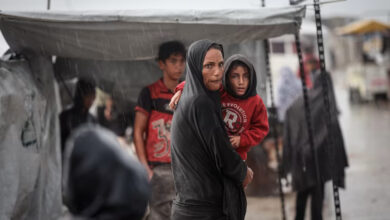State-owned papers Al-Ahram and Al-Akhbar feature in their Monday editions identical stories on the latest escalation in the ongoing war of words between Egyptian and Hamas officials. The papers print statements made by Egyptian Foreign Ministry spokesperson Hossam Zaki on Sunday morning in which he accused Hamas of trying to “rid itself of the onus of being held responsible for the failure to reach a [reconciliation] agreement, which it has been pinned with since the end of last year.” The dispute began when Al-Masry Al-Youm published an interview on Friday with Hamas leader Mahmoud el-Zahar, who claimed that Egyptian Foreign Minister Ahmad Abu Gheit made “inflammatory statements” and said the Egyptian Foreign Ministry “was not in control of Palestinian affairs.”
In a sign that the Egyptian government might be seeking to use the brewing diplomatic row as a way to extricate itself from its intermediary role between Hamas and Fatah, Al-Akhbar’s Mohamed Abdel Manam writes a scathing denunciation of what he calls the “suspicious separationist movement Hamas.” With caustic sarcasm, he suggests that Egypt should thank el-Zahar, the leader of Hamas’ “Gaza wing” for such a “noble invitation” to escape from the “quagmire” of Egypt’s role as Palestinian mediator. He concludes by urging Egypt to reveal “the truth of its conflict with Hamas in all its stages” in a way that will “shut up el-Zahar and all his ilk” who have “not changed since the beginning of the Palestinian tragedy in the 1940’s.”
Al-Sharouq runs the first of a two-part interview with Muslim Brotherhood Supreme Guide Mohamed Badia. Although Badia asserts that the ruling National Democratic Party (NDP) “knows nothing except how to cheat,” he adds that the rampant corruption in Egypt is “the responsibility of all its people,” not just the ruling party. Concerning the Brotherhood’s decision to participate in the recent Shura Council elections, in which it won no seats, Badia replies, “We hoped that the regime would display some political wisdom and not rig the elections so blatantly.” The Brotherhood would also participate in the upcoming People’s Assembly elections, he says, “because we want the Egyptian people to get to know the true nature of the Brotherhood and its program via the elections…”
Regarding the possibility of the Brotherhood aligning with other opposition factions, Badia says his organization is examining the matter, and only rules out cooperation with the NDP. He mentions that he has met with Hassan Nafaa, General Coordinator for Mohamad ElBaradei’s National Association for Change (NAC), and told him that the Brotherhood is receptive to cooperating with other opposition forces, even to the extent of boycotting the elections “on the condition that such a boycott would be effective.”
Al-Dostour’s Abd el-Manam Mahmoud writes a piece on the Brotherhood’s “muted presence” at Friday’s demonstration in Alexandria protesting the 6 June death of Khalid Saeed, allegedly beaten to death by Alexandria police. NAC members complain of the “Brotherhood’s weak participation and its members’ refusal to help manage the logistics” of the protest, which was attended by ElBaradei and Al-Ghad Party founder Ayman Nour.
Brotherhood leader and People’s Assembly deputy Saber Abu el-Fatuh justifies his organization’s weak participation in the protest by noting that “when there are excesses in joint demonstrations like these it is the Brotherhood that ends up paying the price.” However, Mahmoud rejects this explanation, saying the real reason for the group’s low profile is that it does not want to be seen as “contractors” for the opposition. While acknowledging the harsh treatment Brotherhood members receive from Egypt’s security forces, he questions why the organization does not stage its own protests if. “Should we lose hope entirely in the group?” he asks.
Al-Dostour and Al-Shorouq report that clashes continue between security forces and Bedouin tribesmen in Central Sinai following an intensified campaign to crack down on smugglers. Groups of armed Bedouins blocked a major transport road for nearly three hours on Sunday in protest of actions taken by security forces over the past several days. Eyewitnesses claimed that the strategic road, which leads to the el-Auja border crossing between Egypt and Israel, was shut down by authorities after tribesmen opened fire on passing vehicles.
While Bedouin leaders criticize police for using excessive force and for taking several Bedouin women into custody, others charge that Egypt’s Bedouin community, often accused of drug trafficking, is seeking autonomy from Egypt. In an interview with Al-Shorouq, Wadi el-Omr community leader Moussa el-Dalah, wanted by security forces, counters such claims.
“The Bedouin community will never surrender its [Egyptian] identity—under any circumstances,” el-Dalah tells Al-Shorouq. However, El-Dalah adds that “holding our women hostage means that we now consider all prior agreements between us and security forces null and void.”
Egypt’s newspapers:
Al-Ahram: Daily, state-run, largest distribution in Egypt
Al-Akhbar: Daily, state-run, second to Al-Ahram in institutional size
Al-Gomhorriya: Daily, state-run
Rose el-Youssef: Daily, state-run, close to the National Democratic Party’s Policies Secretariat
Al-Dostour: Daily, privately owned
Al-Shorouq:Daily, privately owned
Al-Wafd: Daily, published by the liberal Wafd Party
Al-Arabi: Weekly, published by the Arab Nasserist party
Youm7: Weekly, privately owned
Sawt el-Umma: Weekly, privately owned




